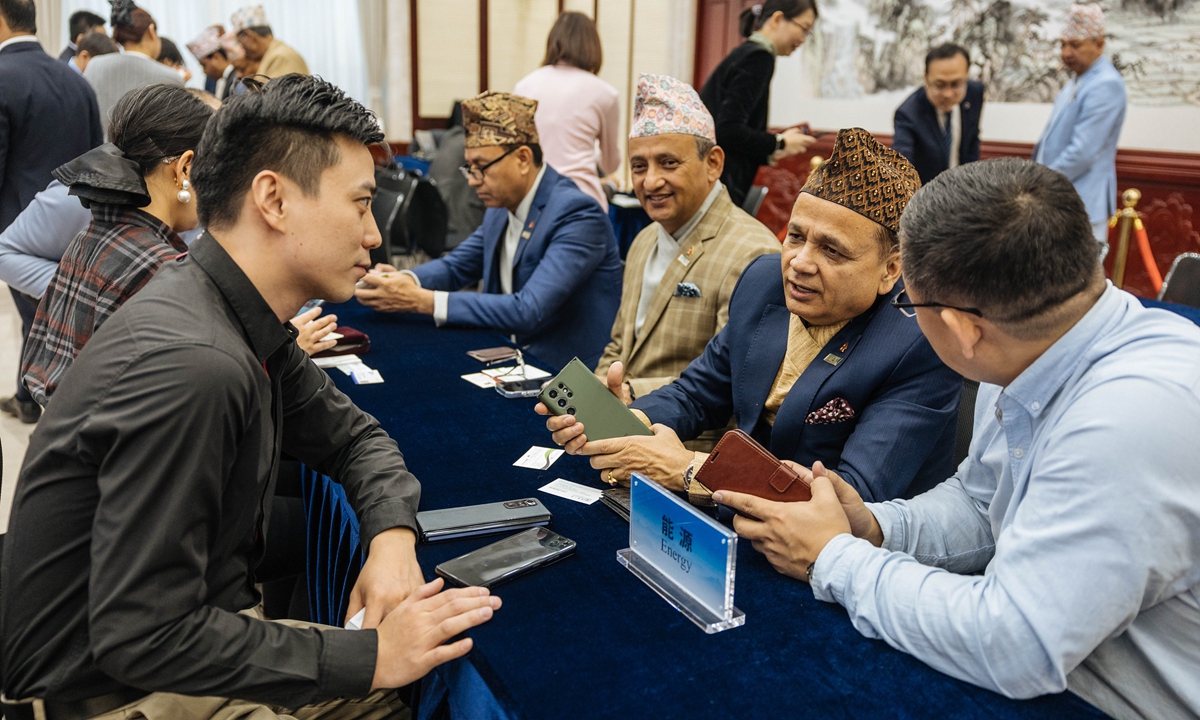China-Nepal business community eyes practical co-op amid PM’s visit

Chinese and Nepalese business representatives gather to discuss new opportunities for practical economic and trade cooperation at the Nepal-China Business Summit, in Beijing on December 4, 2024, with Prime Minister of Nepal KP Sharma Oli in attendance to address the summit. (Li Hao/GT)
Prime Minister of Nepal KP Sharma Oli encouraged business groups from Nepal and China to enhance collaboration. "Trade, commerce, and economic relations between our two countries are now at a new level," Oli said on Wednesday when addressing the Nepal-China Business Summit held in Beijing.
Oli also said that strong economic and trade ties between the two countries have also boosted overall bilateral relations.
"The business community in Nepal views Prime Minister Oli's visit to China as a significant step forward in strengthening Nepal-China relations, particularly in the areas of trade, investment, and infrastructure development," Chandra Prasad Dhakal, President of Federation of Nepalese Chambers of Commerce &Industry (FNCCI), told the Global Times on Wednesday on the sidelines of the summit.
Among the agreements signed during this visit, two are directly related to economic cooperation, which is a promising development for the private sector. These agreements highlight the potential for increased collaboration in trade, investment and technical exchanges, said Dhakal.
"We aspire to see a robust Nepal-China economic partnership that enhances market access for Nepalese goods in China, encourages Chinese investment in Nepal's priority sectors, and promotes technology transfer to improve competitiveness and productivity," said Dhakal.
Dhakal believes that infrastructure is another key area in which Nepal seeks Chinese expertise and investment. The focus is on transformative projects in roads, railways, telecommunications, and aviation. "These initiatives aim to shift Nepal's status from being landlocked to becoming a land-linked nation, connecting us with regional and global markets more effectively."
The Chinese government already said that it will support Nepal's declaration of 2025 as Nepal Visit Year in China. Nepal's tourism industry is ready to welcome Chinese visitors, said Dhakal.
Arjun Prasad Sharma, honorary vice president of Nepal Chamber of Commerce, also told the Global Times on Wednesday that tourism is one of the biggest opportunities to invest in Nepal.
"We've been working with China very closely since our establishment more than 70 years ago. Every time I come to China, I find new opportunities. We are pleased to be part of the delegation [of the Prime Minister] to meet our old and new Chinese friends, and to find some opportunity for mutual benefits," said Sharma.
Sharma also said that the Nepalese business community loves to import from China. New business coming up is automobiles, especially electric vehicles from China.
Zhang Shaogang, vice chairman of the China Council for the Promotion of International Trade (CCPIT), said on Wednesday when addressing the summit that the council is willing to build more trade promotion platforms, organize more economic and trade delegations to visit Nepal, and support Chinese enterprises to import specialty products from Nepal to expand bilateral trade.
"There is no shortage of attractive specialty products in Nepal, but they are still relatively unknown to Chinese consumers," Zhang said.
In terms of enhanced cooperation, Zhang noted that last week, the China Chamber of International Commerce, which is affiliated with CPPIT, together with 18 chambers of commerce and industry, including the FNCCI, from 17 countries along the New International Land-Sea Trade Corridor, jointly established an alliance. This alliance aims to bring together the business communities of various countries to participate in the construction of the corridor.
"The alliance will promote the liberalization and facilitation of trade and investment along the corridor, and maintain the stability and smooth flow of regional and global industrial and supply chains," Zhang said.
At present, China-Nepal economic and trade cooperation is developing steadily. The bilateral trade volume reached $1.8 billion in 2023, up 9.1 percent year-on-year. Notably, China's imports from Nepal increased by 59.5 percent year-on-year, according to statistics from the General Administration of Customs (GAC).
In the first 10 months of 2024, trade volume between the two countries reached $1.58 billion, up 8.7 percent year-on-year, demonstrating the huge potential of bilateral economic and trade cooperation, GAC data showed.
Photos
Related Stories
Copyright © 2024 People's Daily Online. All Rights Reserved.









